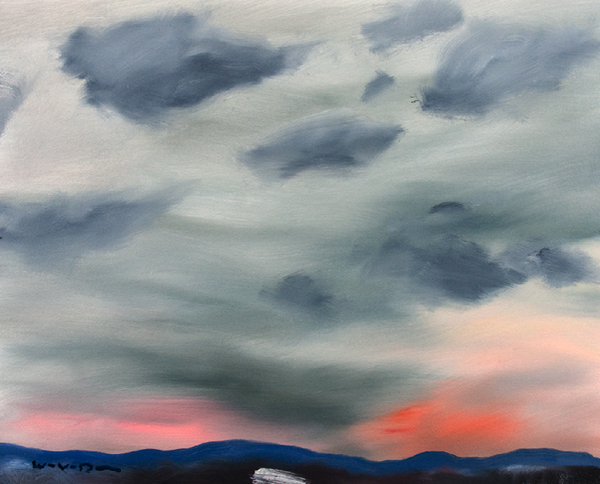 Saturday, February 27, 2010 at 07:15PM | by
Saturday, February 27, 2010 at 07:15PM | by  BVD | in
BVD | in  Prose,
Prose,  Sunset Paintings,
Sunset Paintings,  Sunsetology | tagged
Sunsetology | tagged  Blue Ridge | | Comments Off
Blue Ridge | | Comments Off  Saturday, February 27, 2010 at 07:15PM | by
Saturday, February 27, 2010 at 07:15PM | by  BVD | in
BVD | in  Prose,
Prose,  Sunset Paintings,
Sunset Paintings,  Sunsetology | tagged
Sunsetology | tagged  Blue Ridge |
Blue Ridge |  Share Article | Comments Off
Share Article | Comments Off The wind blows stuff off the porch and all the way out of the yard
Some of it will never be found
Mostly things that were itching to go
And just looking for a good excuse.
 Saturday, February 27, 2010 at 06:14PM | by
Saturday, February 27, 2010 at 06:14PM | by  BVD | in
BVD | in  Poetry |
Poetry |  Share Article | Comments Off
Share Article | Comments Off  William Theodore Van Doren. Sunset from Stony Point, Albemarle County, Va. Oil on watercolor block, 16 x 20.
William Theodore Van Doren. Sunset from Stony Point, Albemarle County, Va. Oil on watercolor block, 16 x 20.
As suggested by the post from earlier today, our nearest neighbor, on one side, is the U.S. Army’s National Ground Intelligence Center. They came here about five years after I did. I wrote the poem after a long walk in the woods, where I could survey the entire length of NGIC headquarters.
 Friday, February 26, 2010 at 07:24PM | by
Friday, February 26, 2010 at 07:24PM | by  BVD | in
BVD | in  Sunset Paintings | tagged
Sunset Paintings | tagged  Blue Ridge,
Blue Ridge,  NGIC,
NGIC,  National Ground Intelligence Center |
National Ground Intelligence Center |  Share Article | Comments Off
Share Article | Comments Off The gingerbread house of my childhood becomes the federal building
The National Ground Intelligence Center perched on 30 acres next door
Four stories of brick and glass and aqua facade you can see
And a lot more you can’t
Brick by brick delicious
Everything icing or cake
All that national ground intelligence
Baked.
 Friday, February 26, 2010 at 02:59PM | by
Friday, February 26, 2010 at 02:59PM | by  BVD | in
BVD | in  Poetry | tagged
Poetry | tagged  NGIC,
NGIC,  National Ground Intelligence Center |
National Ground Intelligence Center |  Share Article | Comments Off
Share Article | Comments Off  Thursday, February 25, 2010 at 07:35PM | by
Thursday, February 25, 2010 at 07:35PM | by  BVD | in
BVD | in  Sunset Paintings | tagged
Sunset Paintings | tagged  Blue Ridge |
Blue Ridge |  Share Article | Comments Off
Share Article | Comments Off
The Ken Burns Style (A Rant)
The following was originally from a few years ago, but I could just as well have written it today. Or, to put it another way, I’d write it now but I already did.
Laura mentioning to me this morning that Ken Burns had been on TV to mark Buck O'Neil’s death and talk about how he’d been passed over for the Hall of Fame set me off on a slightly unrelated rant about how Burns had “ruined documentary history forever.” He’s done this not so much by making sure that his talking-head historians get caught on camera seeming overwhelmed by emotion at the appropriate moments (I actually forgot to mention this), but with his insistence on use of the present tense when describing past events and especially when describing the thoughts, considerations, decisions and actions of historical characters – a practice that I notice has spread to other documentary filmmakers. [And continues, here in 2010.] “McClellan feels that Lincoln has abandoned him.” “Mao sets off on the Long March without his toothbrush, which he leaves as a token for his long-suffering wife.” Stuff like that. You'd think I would actually prefer this mixing of tenses and times, given that I believe everything takes place more or less simultaneously in the present. But I don’t think you can get there from there – you have to make some distinctions clear before you collapse them – you get there from here. That present tense glosses over the fact that the speaker is making judgments and offering necessarily imperfect accounts of something that happened in the past. It turns all events, present and past, into a TV docudrama in which everything is real and unreal at the same time. It sounds authoritative and that’s the worst aspect – that it tends to discourage any awareness that authoritativeness is even an issue. It kills refraction, the sense that events are subject to many possible interpretations. In the name of making the story seem immediate, it actually makes the story very remote, by removing it to the realm of fairy tale. Complete with tear-stained historians, choking up while telling us our bedtime stories.